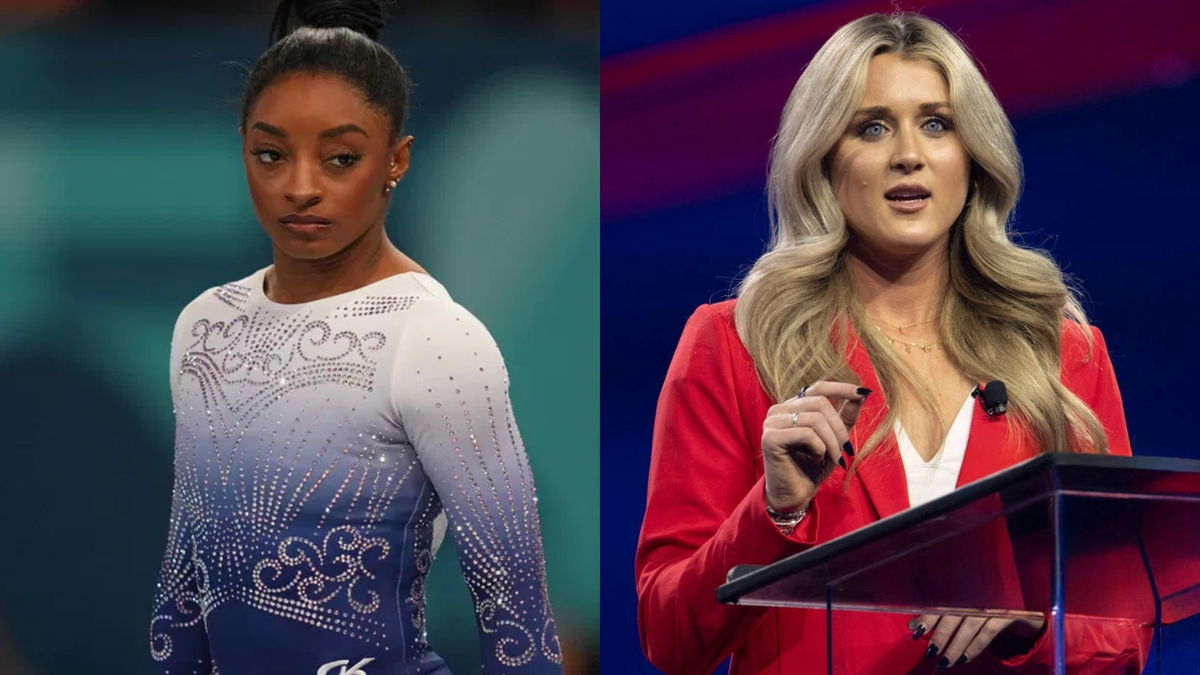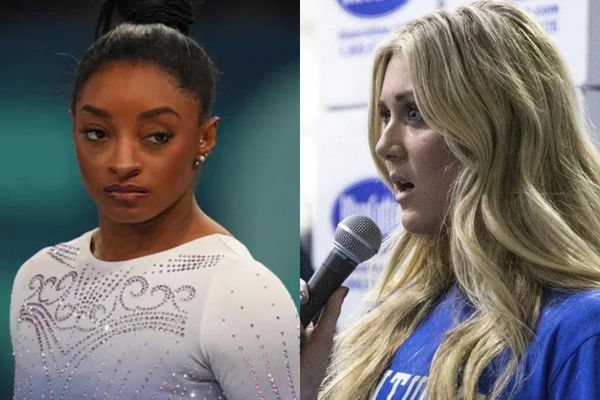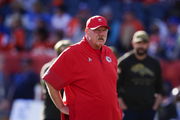
Imago
Credits: Imago

Imago
Credits: Imago
Watch What’s Trending Now!
In the ever-evolving national conversation about transgender athletes in women’s sports, former NCAA swimmer Riley Gaines Barker continues to be one of the most outspoken voices on the subject. In March 2024, Gaines joined 15 other female college athletes in filing a lawsuit against the NCAA, challenging its policies that permit transgender women to compete in female categories. Known for her advocacy on preserving what she views as fairness in women’s athletics, Gaines has since remained firm in her stance.
Her latest comments have sparked widespread attention once again. While Gaines never named specific names, she alleged in the video that certain Olympic-level gymnasts have privately sided with her position. And now, that speculation has taken a dramatic turn. Riley Gaines has shared that some of Simone Biles’ own Olympic teammates have expressed support for her views.
ADVERTISEMENT
This brings a new layer of complexity to an already heated topic. This comes right after Biles herself responded on June 7 to Gaines with a sharp rebuke, “No one in sports is safe with you around.” Rather than tearing others down, Biles urged Gaines to use her platform to create positive change. The conversation has now stretched beyond policy and into deeply personal territory for the athletes themselves.
Riley Gaines Barker, host of the Gaines for Girls podcast, took to Instagram Stories, posting a message that has since stirred further debate. “I thought I’d share also just one more thing,” she began. “I thought I’d share the number of Team USA Olympic athletes who have reached out to me over the past 12 hours—both men and women—across many different sports, including the sport of gymnastics.”
ADVERTISEMENT

ADVERTISEMENT
While she chose not to name anyone, Gaines emphasized that the outreach spanned multiple Olympic disciplines, adding, “It’s harmful to women to allow this, as would 99% of athletes—I would imagine—at that level competing at the highest level would agree with.” Gaines went on to explain that she would not disclose the names of those who contacted her, citing respect for their privacy and the professional consequences that might follow.
“I’m not going to get into any of that. I’m not going to disclose it,” she stated, reiterating that such declarations should come in the athletes’ own time. She also pointed out what she believes is the widespread nature of support among elite athletes. “It’s not a polarizing, divisive issue,” she insisted. The video came in the aftermath of a fiery online exchange between Gaines and Simone Biles.
It began when Gaines criticized a Minnesota high school softball team for including a transgender pitcher, who had secured the state championship for Champlin Park High School. Noting that comments were turned off on the Minnesota State High School League’s celebratory post, Gaines wrote, “To be expected when your star player is a boy.” Biles, never one to shy away from speaking her mind, responded directly.
ADVERTISEMENT
Top Stories
Scottie Scheffler Faces Scrutiny After Taking Out Anger on Golf Club at WM Phoenix Open: ‘Washed’

Jordan Spieth Throws Bizarre Temper Tantrum as Opening Round at WM Phoenix Open Becomes a Challenge

Rob Gronkowski Demands Severe Punishment for Andy Reid After Bill Belichick Snub

PGA Tour Split Into Two as Scottie Scheffler Confirms Stance on Patrick Reed’s Return

Rickie Fowler Fans Demand Answers Following ESPN’s Controversial WM Phoenix Open Decision

Drake Maye Reveals Shoulder Injury Update as Patriots QB Announces News On Super Bowl Availability

“Bully someone your own size,” she wrote. Rather than tearing others down, Biles urged her to advocate for structural solutions, perhaps even proposing a separate transgender category rather than attacking individuals. Gaines rose to national prominence not for podium finishes but for her activism following a fifth-place finish at the NCAA Swimming and Diving Championships.

ADVERTISEMENT
ADVERTISEMENT
Since then, the former University of Kentucky athlete has transformed into one of the most outspoken voices against transgender inclusion in women’s sports. Her platform has expanded through congressional testimony, participation in a lawsuit against the NCAA, and appearances at political events. Despite limited athletic accolades, Gaines has remained at the center of the conversation by tying her message to broader concerns about fairness in sports.
At just 25, Gaines has carved out a high-profile advocacy role, often aligning with conservative figures, including former and current political leaders. Her organization and podcast focus exclusively on gender issues in athletics, positioning her as both a media figure and an activist.
However, her tactics, especially her recent remarks about Simone Biles, have reignited concerns about the tone and direction of the ongoing debate. For many, the decision to reference Biles’ trauma in this context felt like a step too far, prompting renewed scrutiny of the methods Gaines employs in her campaign.
ADVERTISEMENT
ADVERTISEMENT
ADVERTISEMENT
ADVERTISEMENT